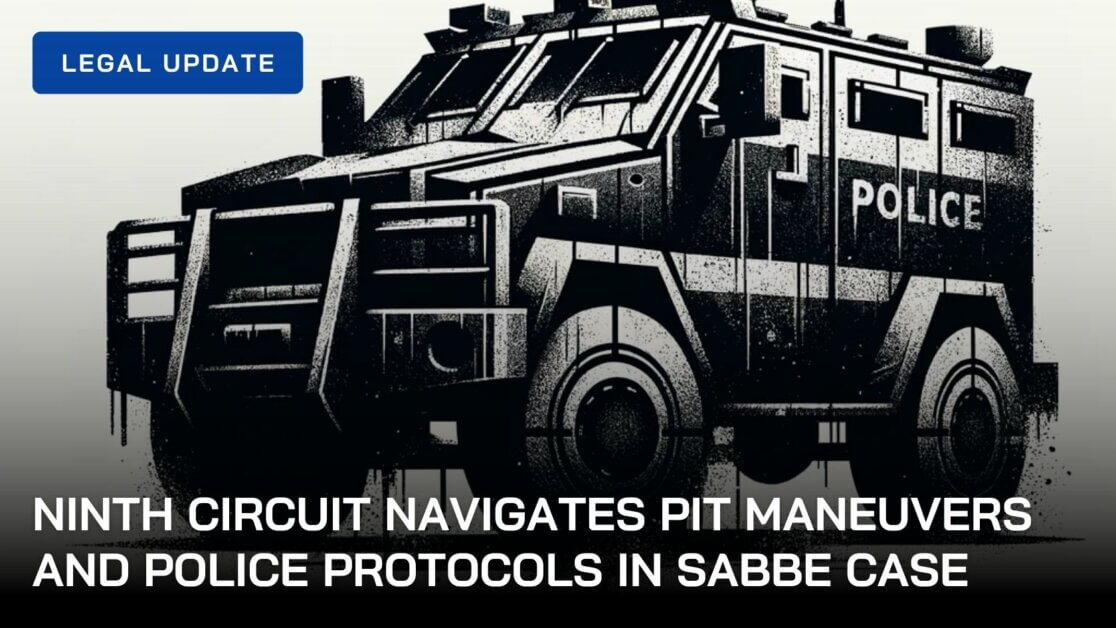Part Two – The Law of Qualified Immunity and Due Process
To fully understand qualified immunity, we need to discuss why qualified immunity is important to the judicial system and taxpayer dollars. More often than not as a Use of Force consultant the questions that I get asked are how do you protect yourself and your agency? And there’s three things that I always recommend. And these three things still apply to the conversation of qualified immunity in the law and how it is processed in the courtroom. Number one, what are industry standards? How did we get qualified immunity? What does it mean? What does it do? And how does it get used by the judicial system in this country? In today’s article we’re going to focus on that last part. And to put it simply, qualified immunity is used inconsistently, and this is really where the biggest area of concern lies, within our agencies and regarding public interest.
The biggest concern that I have is that society needs to know that by legislating qualified immunity, whether it is going be successful or not, will mean that there is going to be a period of time where there is more inconsistency than there ever has been before. And that means law enforcement officers who are scared to use their best judgment and taxpayers who are going to foot the bill of a lot of unwarranted trials.
To begin, let’s walk through how a bill gets passed into a law and why the way lawmakers are going about legislating qualified immunity will cause so much uncertainty. Remember those Saturday morning comics that sang “you’re just a bill sitting on Capitol Hill?” This catchy jingle was used to teach children about our system, the system that is set forth in the document called the Constitution. Well, the Constitution sets forth three branches of government; the legislative branch, the executive branch, and the judicial branch. These branches and the separation of powers are important for checks and balances in our judicial system and government. The Constitution’s biggest concern, or at least the men who drafted the Constitution, was that one person could not have all the power. And in the old days, that would’ve been the king; nowadays that would be the President.
Now, how does it apply here? Well, what we see on a yearly basis is legislatures, senators, representatives, in both state and federal government, running around making laws. And a law, if you’re a bill on Capitol Hill, can be just about anything. If somebody brings the bill to committee, then the bill will begin its process in order to become a law. And what’s occurring here is that the legislatures, it appears maybe some of them to appease their constituents, have addressed the issue of Qualified Immunity saying that we’re going to make a bill that can take away that protection.
So, question, can a bill take away a constitutional protection? The short answer is, no. In fact, the Constitution itself says that a legislature can make any bill and it can even overrule a supreme court case, unless it has a constitutional basis. Here what we’re talking about is suing law enforcement under Fourth amendment, First amendment, Eighth amendment, and Fourteenth amendment applications.
And where will it go from there? Well, it then goes to the executive branch where the executive branch, the governor or the President, has the authority to make it into a law. So, what grounds does the judicial system have? This challenge is going to make the law unstable for law enforcement and for municipalities. And that unstable feeling is going to make it very hard for a lot of government employees to do their jobs and keep these cases from fully going to trial when they don’t need to.
Now If I’m going to give you a history lesson on checks and balances, I should probably give you a little history lesson in Civil Liability 101 as well, since that will lead us to the second part of our discussion: your wallet. If you remember back to the academy days, the Civil Rights Act of 1871[i] gives Americans the unambiguous ability to sue public officials over Civil Rights violations. The civil actions were then developed into what we now call 42 USC section 1983[ii], the United States code section 1983, which alleges a specific deprivation of a constitutional right. Now, if you have any knowledge, as all my colleagues do across the country, and have spent any time in litigation of civil rights claims, the law of 42 USC section 1983 sets the standard and mechanism for how a civil action can be filed against law enforcement.
But I want to pause for a second because one of the first things I want you to take back to those that are having this conversation, and what the public needs to know, is that it’s just not law enforcement. See, in its application, federal Civil Rights claims are brought against all government employees. So, if you are a government employee, then you have the capacity and the protection of qualified immunity; not just law enforcement. If a teacher is employed by a government entity, a firefighter, a health inspector, a mayor, a commission, a board, all of these entities could fall under the protection if they fall under a government employee application. And therefore, what we do know from 1983 application, is there has to be a violation of a specific constitutional deprivation or what we call clearly established law. Where qualified immunity matters here is that there is nothing in this process that is given an additional step because of qualified immunity.
Now back to civil liability and the judicial system: In a civil action, (usually in both federal and state court), a plaintiff will file a complaint. It’s just an allegation against the government employee. They will then go into what’s called the pleading practices, where there is an answer to the complaint and sometimes a motion to dismiss. Very unlikely in most parts of this country that you will get a case dismissed in a motion to dismiss level for qualified immunity and that is where there’s a huge misconception by society.
Well, what does that mean? It means that you still have another step, which is the discovery portion, where there are interrogatories and depositions where evidence is presented to justify, articulate, or explain either the plaintiff’s allegations and/or the defense by the government officials. That leads us to summary judgment.
And one misunderstanding of the aspects of government application or municipal liability is how important a summary judgment ruling is for the defense. Let me be clear: what the public needs to know is it’s not just important to the government official, i.e., the police officer or the municipal employee. It is also important to the taxpayer. Because the purpose of summary judgment is to ensure that we’re not going to waste any more of the court’s time. And here, in summary judgment, the court is deciding whether the case goes forward and they’re assigning it based on a legal issue. What is misunderstood by the public is that facts cannot be part of the analysis. When it comes to summary judgment, the facts must be in the favor of the plaintiff, meaning the plaintiff gets to say whatever they want about what happened. In the defense, the officers, this municipal defense, has to just accept that as part of it.
Now, if the plaintiff can defeat the aspect of summary judgment, usually they defeat it because of a disputed issue of fact, which is my first most important point when it comes to use of force law. See, a lot of the arguments surrounding qualified immunity are that individuals are saying that qualified immunity protects officers from the use of excessive force, which cannot be further from the truth. Because oftentimes in use of force cases, there is a question of fact, meaning the plaintiff says the officer did this and the officer did that. And the officer says, “No, I didn’t do that. I did this and I did that.” That is called a disputed issue of fact. If there is a disputed issue of fact, summary judgment cannot be won on either side and it must go to trial. Therefore, we have qualified immunity or governmental immunity.
The purpose of this is to ensure that frivolous lawsuits do not continue because they cost taxpayers thousands and thousands of dollars. Well, if you make it through summary judgment, then we get the settlement. And I’ve seen numbers as high as 95% of all cases brought by people that sue law enforcement agencies cases settle. They get money, they accept money in return for doing away with the case. And then there’s a very, very, very small portion that will continue on to trial because courts must resolve qualified immunity issues as early in the case as possible, preferably before discovery.
What you’re doing here, and attorney Jack Collins said it in an article very well, in throwing the baby out with the bath water, you’re actually bringing the liability, not just against law enforcement into this analysis, but the liability against all lawsuits against government, period. So, think about that for a second. Do you think there’s a lot of government lawsuits?
Well, a study I looked at from seven years ago said that there were approximately 30,000 lawsuits filed against the government on a yearly basis; 30,000 lawsuits. I guarantee you that number is much higher today. I just couldn’t find any new data on it, which basically means that’s significantly an issue. Although qualified immunity frequently appears in cases involving police officers, it also applies to most other executive branch officials.
So, what do we know about qualified immunity? Well, we know this; the debate on qualified immunity, if you just look around, is on allegations that qualified immunity prevents police officers from being held accountable for misconduct. If you go back to 2009 in the Pearson’s case by the supreme court, the court said this: qualified immunity balances two important interests, the need to hold public officials accountable when they exercise power irresponsibly, and the need to shield officials from harassment, distraction, and liability when they perform their duties reasonably[iii]. And now that we know more about how qualified immunity gets processed in the court system, we can agree that qualified immunity is not immunity from having to pay money damages. That’s not the case at all. But rather it’s immunity from having to go through the cost of trial at all.
So, while the public may look at qualified immunity as protecting only law enforcement officers, they are incredibly wrong. It protects our judicial system, the taxpayer, and lastly, the rights of all government employees, not just law enforcement. Keep this and the judicial process in mind when arguing the case for qualified immunity.
This wraps up part two of our discussion; next week in the final article of this three-part series we will discuss what the public really needs to know about qualified immunity.
[ii] 42 U.S. Code § 1983.Civil action for deprivation of rights



